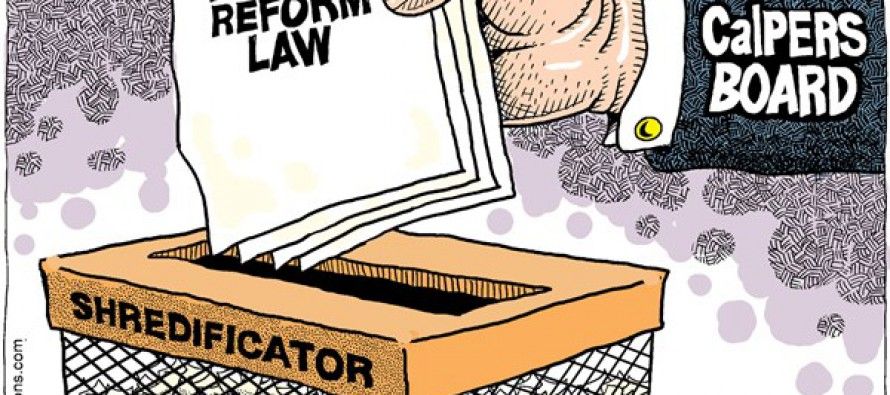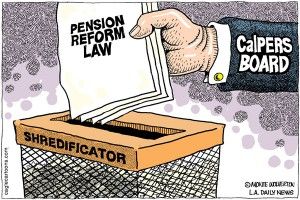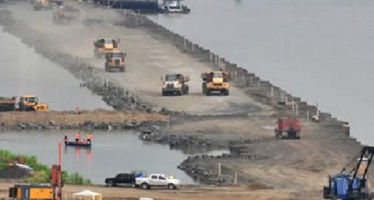Brown hits CalPERS on pension spiking

 A bad month for CalPERS has gotten worse. On the heels of unfavorable news surrounding its investment strategy and leadership, the California Public Employee Retirement System provoked the wrath of Gov. Jerry Brown, who heaped scorn on its latest “pension spiking” plan.
A bad month for CalPERS has gotten worse. On the heels of unfavorable news surrounding its investment strategy and leadership, the California Public Employee Retirement System provoked the wrath of Gov. Jerry Brown, who heaped scorn on its latest “pension spiking” plan.
“Today CalPERS got it wrong,” Brown said in a statement, revealing he had asked his staff to determine what could be done to “protect the integrity” of legislation enacted just last year to combat such schemes. An audit of CalPERS pension spiking, underway in the State Controller’s office, is set to be released soon.
A cat and mouse game
Employees spike pensions by using overtime, vacation time and similar benefits to drive up their income before retirement. CalPERS, the largest pension fund in the country, ran afoul of the governor’s wishes by permitting such temporary pay increases to count as “pensionable income,” the amount used to calculate the size of retirement pensions.
The move flew in the face of Assembly Bill 340, signed into law by Brown as the Public Employees’ Pension Reform Act. Its aim was to make a dent in the public pensions crisis that has threatened to overwhelm city and state budgets. Through a series of complex regulatory adjustments, PEPRA made newer public employees much more responsible for paying the cost of their retirement benefits. While Brown and his allies cheered the over $50 billion in expected savings over 30 years, unions such as the Service Employees International Union decried the changes.
One of Brown’s key objectives was to use PEPRA to crack down on pension spiking. As The Wall Street Journal reported, PEPRA “ostensibly closed these loopholes by defining ‘pensionable compensation’ as ‘base pay’ for ‘services rendered on a full-time basis during normal working hours.'” In other words, extras like “unused vacation and sick leave” were officially off limits.
But CalPERS, as the Journal put it, “tried to end run the law by including 99 other salary boosters such as ‘incentive pay’ for ‘local safety members, school security officers and California Highway Patrol officers who meet an established physical fitness criterion.'”
Flagrant abuses
As it turns out, these under-the-radar boosters have proliferated among public workers. In his criticism of CalPERS, Brown focused exclusively on the evils of temporary pay as a source of pension spiking.
But new investigations have turned up myriad abuses. The San Francisco Chronicle, for instance, uncovered special “marksmanship pay” for cops; an “asphalt work premium” for those who “mix, transport and/or apply a tar-like substance for sidewalks, roads, roofs and/or parking lots”; an “audio visual premium” for “workers who are consistently responsible for operating audio visual equipment”; and a “circulation librarian premium,” which applies, as one might imagine, to circulation librarians — apparently for doing nothing more than their jobs.
The flagrant use of double-payment techniques like these helped fuel support for Brown from the League of California Cities. That organization, according to PublicCEO.com, echoed Brown’s criticism of pension spiking in an effort to push CalPERS “to narrow the scope of pensionable compensation and review the extra pay items to see if they still serve a public service. Chris McKenzie, the League executive director, told the board hundreds of California cities are still in financial distress and facing six years of increasing CalPERS rates” — with the higher rates paid ultimately by local taxpayers.
A credibility gap
The chorus of anger directed at CalPERS comes at an especially embarrassing time. CalPERS board member Priya Mathur is in hot water with the Fair Political Practices Commission over her repeated failure to file legally mandated reports on campaign contributions and so-called statements of economic interest. After some $13,000 in fines, the Los Angeles Times reports, the CalPERS board “punished” Mathur “by temporarily removing her as chairwoman of the health committee and suspending her traveling privileges.”
Related Articles
Dock strife boosted political spending
The work dispute between West Coast longshore workers and the major shipping companies may be headed for peace. But the
CA golf club suit deepens Trump woes
Another unflattering story from Donald Trump’s recent past, this one playing out in California, has fueled a fresh round
Investigating the CA Delta
Before attending an event for the Pacific Research Institute, CalWatchdog.com’s parent think tank, earlier this month I drove around two




